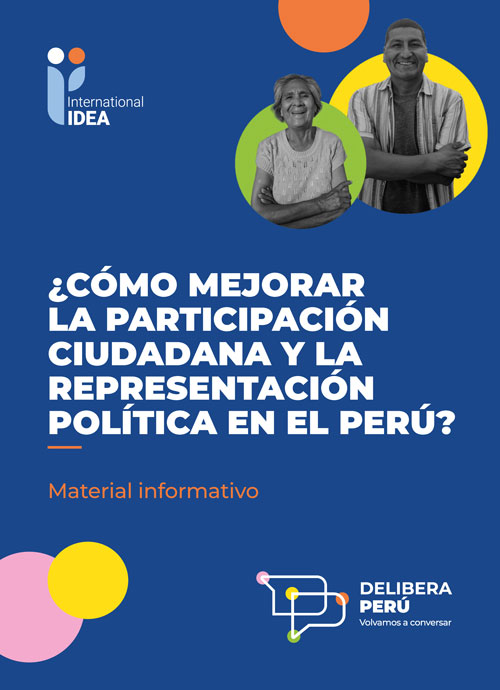This Primer examines the recognition, roles and rights of the opposition and the legislative minority in democratic constitutions. Opposition parties operating in democracies rely upon a wide range of constitutional protections, such as the freedoms of association, assembly and expression, backed by an independent judiciary and an impartial civil service.
Search
Region
Country
Type
Public participation has become a core element of modern constitution-building. Robust participation is credited with a range of benefits—from improving individual behaviours and attitudes to democracy to shaping elite bargaining dynamics, improving constitutional content, and strengthening outcomes for democracy and peace. Yet it is not well understood whether and how public participation can achieve these ends.
The third webinar of the Democratic Development in Melanesia Webinar Series was held on 24 June 2021 on electoral activism by civil society organisations using the experiences of Indonesia and the Philippines as examples.
When electoral risks are not understood and addressed, they can undermine the credibility of the process and the results it yields. Electoral management bodies (EMBs) encounter numerous risks across all phases of the electoral cycle. They operate in environments that are increasingly complex and volatile and where factors such as technology, demographics, insecurity, inaccurate or incomplete information and natural calamities, create increasing uncertainty.
Across the world, election management bodies (EMBs) operate as bulwarks of the democratic process. By superintending electoral competition, EMBs uphold democratic values, influence political behaviour and shape the character of democratic institutions.
Political parties are considered gatekeepers for women’s access to political positions, as they play an important role in institutionalizing women’s inclusion in politics. Ensuring that political parties in Sudan play an active role in the advancement of gender equality and the enhancement of women’s political participation is particularly important as Sudan prepares for its transition to democracy.
Electoral management bodies (EMBs) around the world are currently faced with operational challenges and requirements for adaptations due to the Covid-19 pandemic. While many voters look towards election day and their safety at the polls, EMBs have already begun work to ensure safe practices are implemented in pre-election day activities, including voter registration.
Dr. Kevin Casas-Zamora is the Secretary-General of the International Institute for Democracy and Electoral Assistance (IDEA), with over 25 years of experience in democratic governance as a researcher, analyst, educator, consultant and public official. Here he discusses the role that democracy plays in mitigating climate change.
The Fijian General Election of 2018 was a significant one- it was only the second election held under a new electoral system and legal framework.
Desde el retorno a la democracia hasta las últimas elecciones (en Chile), la participación electoral ha ido constantemente decayendo, con algunas excepciones, como el plebiscito de octubre pasado. Las cifras de la elección de segunda vuelta de gobernadores fueron realmente preocupantes, con un promedio de un 19% (25% en la región con mayor participación, la Metropolitana, probablemente por lo competitiva que se percibía).
IDEA Internacional organizó un seminario web el 16 de junio de 2021 titulado: "¿Qué está pasando con la democracia en América Latina?" como parte de su nueva serie de seminarios en línea #DebatingDemocracy.
This news article is available in English.
Disclaimer: Views expressed in this commentary are those of the author. This commentary is independent of specific national or political interests. Views expressed do not necessarily represent the institutional position of International IDEA, its Board of Advisers or its Council of Member States.
Aclaración: Las opiniones expresadas en este artículo son exclusivas de su autor e independientes de intereses nacionales o políticos particulares. Además, estas opiniones no representan necesariamente la posición institucional de IDEA Internacional, su Junta de Asesores o su Consejo de Estados Miembros.
International IDEA hosted a webinar on 16 June 2021 entitled: “What’s happening to democracy in Latin America?” as part of its new #DebatingDemocracy Webinar Series.
Este artículo está disponible en español.
Democracy is not just a type of regime; it is a human aspiration and the only type of government that allows us to pursue the type of lives we want to lead. It checks power, enables free speech, and guarantees our participation.
Mongolia’s presidential elections were concluded on 9 June 2021 with the party in government, the Mongolian People’s Party, consolidating power further by taking the presidency with a landslide victory. However, voter turnout declined very slightly compared to 2017 and young voters are still not coming to vote in droves.
The Community of Democracies (CoD) in cooperation with the International Institute for Democracy and Electoral Assistance (International IDEA), and the Open Government Partnership (OGP), gathered on 23 April to discuss the future of Democracy in accordance with
أحدث الفصل ٤٩ من الدستور تغييراَ جذرياً في منظومة حماية حقوق الإنسان في تونس، إذ يكاد يكون المادة الجامعة الوحيدة في الدساتير العربية التي تضع الشروط والمعايير المتعلقة بتنظيم الحقوق والحريات وضبط إطار لتدخّل المشرع ومختلف السلط العمومية بالاستناد إلى مبدأ التناسب بين ضوابط تقييد الحقوق وموجباتها.
Ante el difícil contexto político en el cual se resuelven las observaciones de actas y nulidades de votación en mesa en Perú, el Instituto Internacional para la Democracia y la Asistencia Electoral (IDEA Internacional):
Ethiopia is set to hold general elections on 21 June 2021 amid a devastating war in Tigray region and continuing security challenges across the country. But this was not how things were supposed to pan out.
